From Panic to Peace: 10 Effective Methods to Calm Anxiety
Anxiety is a common emotional response that many individuals experience in today’s fast-paced and stressful world. It can manifest in various ways, such as racing thoughts, restlessness, and physical tension.
However, it is essential to recognize that anxiety is a normal part of life and can be managed effectively through a combination of techniques and strategies.
In this article, we will explore ten effective methods to calm anxiety, ranging from deep breathing techniques and mindfulness practices to herbal remedies and seeking professional help.
By gaining a deeper understanding of anxiety and implementing these proven methods, individuals can transition from panic to peace and regain control over their mental well-being.
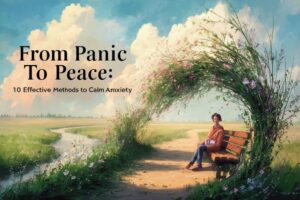
Table of Contents
ToggleWhat is Anxiety?
Anxiety is a complicated psychological condition that involves feelings of worry, fear, and apprehension. It is a normal response to stressful situations, but when it becomes excessive and chronic, it can greatly impact an individual’s daily functioning and overall well-being.
It can appear in different ways, including generalized anxiety disorder, social anxiety disorder, panic disorder, and phobias. These conditions can be debilitating and can significantly impair an individual’s ability to lead a full and productive life.
The underlying causes of anxiety are not fully understood, but it is believed to be a combination of genetic, environmental, and neurobiological factors.
Genetics may play a role in predisposing individuals to anxiety disorders, while environmental factors such as traumatic events or chronic stress can trigger or exacerbate symptoms.
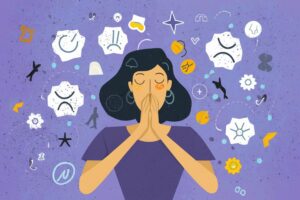
Neurobiological factors, including imbalances in neurotransmitters such as serotonin and dopamine, also contribute to the development of anxiety disorders.
Additionally, cognitive and behavioral factors, such as negative thought patterns and avoidance behaviors, can perpetuate anxiety symptoms and make them more difficult to overcome.
Treatment for anxiety typically involves a combination of medication, psychotherapy, and lifestyle modifications. Medications such as selective serotonin reuptake inhibitors (SSRIs) and benzodiazepines are commonly prescribed to help manage symptoms.
Cognitive-behavioral therapy (CBT) is also highly effective in treating anxiety by helping individuals identify and challenge negative thought patterns and develop coping strategies to manage their anxiety.
Lifestyle modifications such as regular exercise, healthy eating, and stress management techniques can also help reduce anxiety symptoms and improve overall mental health.
Overall, it is important for individuals experiencing anxiety to seek help from mental health professionals in order to effectively manage their symptoms and improve their quality of life.
Read more about “How to Identify Psychopathy through 7 Unique Eye Patterns?”
Signs and Symptoms of Anxiety
Anxiety is a mental health issue that can greatly affect a person’s daily routine. It is important to recognize the signs and symptoms of anxiety in order to seek appropriate treatment and support. One of the key indicators of anxiety is excessive worry and fear.
Individuals with anxiety may experience persistent and overwhelming feelings of dread, even when there is no apparent threat or danger present. This can lead to difficulty concentrating, sleeping, or carrying out everyday tasks.
In addition to cognitive symptoms, anxiety can also manifest physically. Physical symptoms of anxiety can include muscle tension, rapid heart rate, sweating, and trembling.
These physical manifestations of anxiety are the body’s way of responding to perceived threats and can be distressing for individuals experiencing them.
Furthermore, anxiety can also lead to gastrointestinal issues such as stomach aches, nausea, and diarrhea. These physical symptoms can significantly impact an individual’s quality of life and functioning.
Emotional symptoms of anxiety can also be debilitating. Individuals with anxiety may feel irritable, on edge, or easily agitated. They may also experience feelings of restlessness, fatigue, and a sense of impending doom.
These emotional symptoms can take a toll on an individual’s mental well-being and can contribute to a cycle of anxiety and distress. It is important for individuals experiencing these emotional symptoms to seek support from a mental health professional in order to address their anxiety and improve their overall well-being.
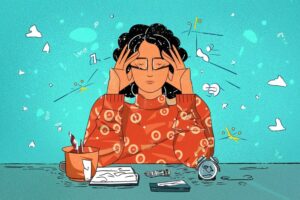
Overall, recognizing and understanding the signs and symptoms of anxiety is crucial for early intervention and treatment. By being aware of the cognitive, physical, and emotional manifestations of anxiety, individuals can seek appropriate support and coping strategies to manage their symptoms.
It is important for individuals experiencing anxiety to reach out for help and not suffer in silence. With proper treatment and support, individuals with anxiety can learn to manage their symptoms and improve their quality of life.
Read more about “Is Your Partner Self-Obsessed? Take This Narcissistic test”
Causes and Common Triggers of Anxiety
Anxiety can appear in different ways, like generalized anxiety disorder, panic disorder, and social anxiety. Understanding the causes and common triggers of anxiety is essential in developing effective treatment and coping strategies.
One of the primary causes of anxiety is genetics, as studies have shown that individuals with a family history of anxiety disorders are more likely to develop the condition themselves.
Additionally, brain chemistry plays a significant role in the development of anxiety, with imbalances in neurotransmitters such as serotonin and dopamine contributing to symptoms of anxiety.
Environmental factors also play a crucial role in the onset of anxiety. Traumatic or stressful life events, such as physical or emotional abuse, the loss of a loved one, or financial difficulties, can trigger feelings of anxiety in susceptible individuals.

Chronic stress, such as work-related pressures or relationship problems, can also contribute to the development of anxiety disorders.
Moreover, a person’s upbringing and early experiences can shape their propensity for anxiety, with individuals who were raised in an unstable or chaotic environment more likely to develop anxiety later in life.
Common triggers of anxiety can vary from person to person, but some universal triggers include social situations, public speaking, exams, and uncertainty about the future.
These triggers can provoke feelings of fear, worry, and nervousness, leading to physical symptoms such as rapid heartbeat, sweating, and trembling.
Avoidance behaviors, such as staying home to avoid social interactions or procrastinating on important tasks, can also exacerbate anxiety symptoms and perpetuate the cycle of anxiety. Cognitive behavioral therapy and exposure therapy are often used to help individuals confront and overcome their fears and anxieties.
In short, anxiety is a complex and multifaceted mental health condition with a variety of causes and triggers. Genetic predisposition, brain chemistry, environmental factors, and past experiences all play a role in the development of anxiety disorders.
Identifying and understanding these underlying causes is crucial in developing personalized treatment plans for individuals suffering from anxiety.
By addressing the root causes of anxiety and learning to manage common triggers, individuals can take control of their mental health and lead fulfilling, anxiety-free lives.
Read more about “How Chronic Pain impacts Your Interpersonal Connections?”
Impact of Anxiety on Mental and Physical Health
Anxiety can have a significant impact on both mental and physical health. Individuals experiencing anxiety may constantly feel on edge, nervous, or apprehensive about everyday situations.
This constant state of alertness can lead to increased stress levels, which in turn can have detrimental effects on both mental and physical well-being.
On a mental health level, anxiety can manifest as difficulty concentrating, irritability, and feelings of overwhelming panic. These symptoms can interfere with one’s ability to function in everyday life, affecting work, relationships and overall quality of life.
Additionally, anxiety disorders are often linked to other mental health conditions such as depression, further exacerbating symptoms and creating a cycle of negative emotions.
From a physical health perspective, anxiety can manifest in a variety of ways, including muscle tension, headaches, gastrointestinal issues, and fatigue. Prolonged periods of anxiety can also weaken the immune system, making individuals more susceptible to illnesses and infections.
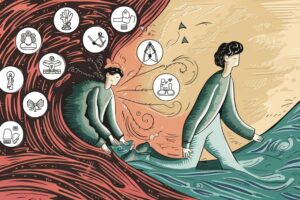
Moreover, individuals with anxiety may engage in coping mechanisms such as substance abuse or unhealthy eating habits, further compromising physical health.
Overall, the impact of anxiety on both mental and physical health is undeniable. It is crucial for individuals experiencing anxiety to seek help from mental health professionals in order to learn effective coping strategies and tools to manage their symptoms.
By addressing anxiety and its effects on both mental and physical well-being, individuals can take steps towards improving their overall health and well-being.
Read more about “What are the Hidden Symptoms of Generalized Anxiety Disorder?”
10 Effective Methods to Calm Anxiety
1) Deep breathing exercises to reduce stress and promote relaxation
In today’s fast-paced and constantly evolving world, stress has become a common adversary that affects many individuals across all walks of life. One effective method to combat stress and promote relaxation is through the practice of deep breathing exercises.
Deep breathing is the act of inhaling slowly through the nose and exhaling slowly through the mouth. By focusing on the breath and taking deliberate, controlled inhales and exhales, individuals can activate the body’s relaxation response and reduce the levels of stress hormones in the body.
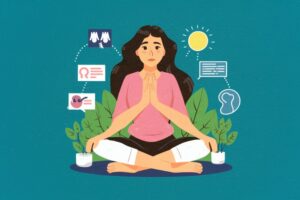
Research has shown that deep breathing exercises can have a profound impact on reducing stress and promoting relaxation. By engaging in deep breathing, individuals can lower their heart rate, decrease blood pressure, and calm the mind.
Furthermore, deep breathing exercises can also improve oxygen flow to the brain, leading to enhanced cognitive function and mental clarity.
Incorporating deep breathing exercises into a daily routine can provide individuals with a simple yet powerful tool to combat stress, improve overall well-being, and promote a sense of calm and relaxation in the midst of life’s challenges.
2) Mindfulness techniques for staying present and reducing anxious thoughts
Mindfulness techniques have been shown to be effective in reducing anxious thoughts and promoting mental well-being. One such technique is focused breathing, where individuals concentrate on their breath and observe the sensation of inhaling and exhaling.
By grounding themselves in the present moment, individuals can shift their focus away from anxious thoughts and cultivate a sense of calm.
Another useful technique is body scanning, where individuals systematically direct their attention to different parts of their body, noticing any tension or discomfort and practicing relaxation techniques to release that tension.
This practice helps individuals become more attuned to their bodily sensations and provides a sense of grounding in the present moment, reducing the impact of anxious thoughts.
In addition to focused breathing and body scanning, mindfulness meditation can also be an effective strategy for reducing anxious thoughts. By sitting quietly and observing their thoughts without judgment, individuals can develop a greater awareness of the patterns and triggers of their anxiety.
This increased self-awareness allows individuals to step back from their anxious thoughts and respond to them in a more mindful and intentional way. Incorporating mindfulness techniques into daily routines can help individuals build resilience to anxiety and improve their overall mental well-being.
3) Progressive muscle relaxation for releasing tension in the body
Progressive muscle relaxation (PMR) is a technique used to release tension in the body by systematically tensing and then relaxing different muscle groups. This practice has been shown to be effective in reducing stress, anxiety, and muscle tension, making it a valuable tool for promoting overall wellbeing.
By focusing on individual muscle groups and consciously relaxing them, PMR allows individuals to become more aware of their body and the physical sensations associated with stress and tension. This heightened awareness can help individuals better manage and alleviate these symptoms, leading to a greater sense of relaxation and calm.

Research has demonstrated the efficacy of PMR in reducing the physical symptoms of stress, such as elevated heart rate and muscle tension.
By engaging in regular practice of PMR, individuals can learn to recognize and address the physical manifestations of stress, ultimately leading to a more relaxed and balanced state of being.
Additionally, PMR has been found to have a positive impact on mental health, with studies showing a decrease in anxiety and an increase in overall feelings of wellbeing. Incorporating PMR into a daily self-care routine can be a valuable tool allowing for improved focus, concentration and overall performance.
4) Journaling as a tool for processing emotions and managing anxiety
Journaling is a valuable tool for processing emotions and managing anxiety. Through the act of writing down one’s thoughts and feelings, individuals are able to reflect on their experiences and gain a deeper understanding of their emotions.
Journaling provides a safe and private space for individuals to explore their innermost thoughts and feelings, helping them to make sense of their emotions and identify patterns in their thoughts and behaviors.
This self-reflection can lead to increased self-awareness and emotional intelligence, which can in turn help individuals better manage their anxiety.
In addition to helping individuals process their emotions, journaling can also serve as a coping mechanism for managing anxiety. Writing in a journal can provide a sense of release and catharsis, allowing individuals to express their worries and fears in a healthy way.
By externalizing their thoughts and feelings through writing, individuals can reduce the intensity of their anxiety and gain a sense of control over their emotions.
Journaling can also help individuals to identify triggers for their anxiety and develop strategies for coping with stress and anxiety-provoking situations. Overall, journaling can be a powerful tool for promoting emotional well-being and managing anxiety in a proactive and constructive manner.
5) Physical exercise to release endorphins and improve mood
Physical exercise has been scientifically proven to release endorphins in the brain, which are neurochemicals that act as natural painkillers and mood elevators. When we engage in physical activity, our body releases endorphins which help to alleviate stress, reduce anxiety, and improve overall mood.
This is because endorphins interact with receptors in our brain to block pain signals and trigger a positive feeling in the body.
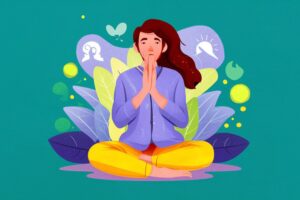
As a result, regular physical exercise can have a significant impact on mental health and well-being, making it an important aspect of self-care and stress management.
In addition to releasing endorphins, physical exercise also has a number of other benefits for mental health. Regular exercise has been shown to increase levels of serotonin and dopamine in the brain, two neurotransmitters that play a key role in mood regulation.
By boosting levels of these feel-good chemicals, physical activity can help to combat symptoms of depression and anxiety, as well as improve overall cognitive function.
Furthermore, exercise can also help to promote better sleep, reduce inflammation in the body, and boost self-esteem, all of which can contribute to a more positive and balanced mental state.
Overall, incorporating regular physical exercise into your routine can be a powerful tool for improving mood and enhancing your overall mental well-being.
6) Reaching out to friends, family, or a therapist for help and support
Seeking support from friends, family, or a therapist is a crucial aspect of maintaining good mental health and emotional well-being. Friends and family provide a strong support system that can offer comfort, understanding, and perspective during challenging times.
They can offer a listening ear, valuable advice, and a sense of companionship that can help alleviate feelings of loneliness and isolation. Additionally, friends and family can offer different perspectives on a situation, helping to broaden one’s understanding and aiding in problem-solving.
In times of crisis or distress, having a strong support system in place can make a world of difference in coping with difficulties and building resilience.
However, there are times when seeking support from friends and family may not be enough, and professional help from a therapist may be necessary. Therapists are trained professionals who can offer specialized interventions and techniques to address specific mental health challenges.
They provide a safe and confidential space for individuals to explore their emotions, thoughts, and behaviors, and can offer valuable insight and tools for coping with stress, anxiety, depression, and other mental health concerns.
Therapists can also provide a neutral perspective on issues, helping individuals to gain clarity and develop healthier coping mechanisms.
In short, seeking support from friends, family, or a therapist is essential for maintaining good mental health and emotional well-being, and can provide a valuable source of strength and resilience during difficult times.
7) Limiting caffeine and alcohol intake to reduce anxiety triggers
Caffeine and alcohol are two substances that are commonly consumed, but their effects on anxiety can be significant. Both caffeine and alcohol can act as triggers for anxiety, exacerbating symptoms and making them worse.
Caffeine is a stimulant that can increase heart rate and blood pressure, leading to feelings of restlessness and jitteriness. This can contribute to feelings of anxiety and make it more difficult to cope with stressors.

Similarly, alcohol is a depressant that can have a calming effect initially, but overconsumption can lead to increased feelings of anxiety and heightened emotional responses. Limiting the intake of these substances can help to reduce the risk of anxiety triggers and promote overall mental well-being.
By limiting caffeine and alcohol intake, individuals can better manage their anxiety and prevent potential triggers. Making conscious choices about what we consume can have a significant impact on our mental health and overall quality of life.
Instead of relying on these substances as coping mechanisms, finding healthier alternatives such as exercise, mindfulness practices and proper nutrition can help to reduce anxiety and promote a sense of well-being.
By addressing the root causes of anxiety and making mindful choices about our habits and routines, we can take control of our mental health and work towards a more balanced and fulfilling life.
8) Creating a calming environment at home or workspace
In today’s fast-paced and stressful world, anxiety is a common issue for many people. Creating a calming environment at home and workspace can significantly help in reducing anxiety levels and promoting overall well-being.
At home, incorporating elements such as soft lighting, soothing colors, and comforting scents like lavender or chamomile can create a tranquil atmosphere that promotes relaxation.
Decluttering and organizing spaces can also help in reducing feelings of overwhelm and promoting a sense of calmness. Additionally, integrating calming activities such as yoga, meditation, or listening to calming music can further enhance the serene environment at home.
Similarly, creating a calming environment at work is essential in reducing anxiety and promoting productivity. Incorporating elements such as natural light, plants, and ergonomic furniture can help in creating a comfortable and stress-free workspace.
Taking regular breaks and incorporating mindfulness practices into the workday can also help in reducing anxiety levels and improving focus.
Encouraging open communication and fostering a supportive work culture can further contribute to a calming work environment.
By prioritizing the creation of calming environments both at home and work, individuals can effectively manage their anxiety levels and improve their overall quality of life.
9) Practicing self-care activities such as meditation, yoga, or hobbies
Self-care activities are essential for managing anxiety and promoting overall well-being. Engaging in regular self-care practices can help individuals reduce stress, improve their mood, and increase their resilience to challenging situations. Activities such as exercise, meditation, and mindfulness can help calm the mind and body, reducing the symptoms of anxiety.
Physical activity has been shown to release endorphins, which are natural mood lifters, while meditation and mindfulness techniques can help individuals focus on the present moment and cultivate a sense of inner peace.
In addition to these practices, self-care activities such as spending time in nature, practicing relaxation techniques, and engaging in hobbies can also be beneficial for reducing anxiety.
Being in nature has been shown to have a calming effect on the nervous system, while relaxation techniques such as deep breathing and progressive muscle relaxation can help reduce tension and promote relaxation.
Engaging in hobbies that bring joy and fulfillment can also be a valuable form of self-care, as it provides a sense of purpose and satisfaction. By incorporating these self-care activities into their daily routine, individuals can better manage their anxiety and improve their overall quality of life.
10) Lifestyle Changes for Long-Term Anxiety Management
Anxiety disorder is one of the most common and abundant mental health issue throughout the world. While medication and therapy can be effective treatments for anxiety, lifestyle changes are also crucial for long-term management. One key example of lifestyle changes for managing anxiety is regular exercise.
Exercise has been shown to reduce symptoms of anxiety by releasing endorphins, which are natural mood lifters. Additionally, exercise can help regulate the body’s stress response, promote better sleep, and increase overall mental well-being. Developing a consistent exercise routine can provide significant benefits for individuals struggling with anxiety.

Another important lifestyle change for long-term anxiety management is maintaining a healthy diet. Eating a balanced diet rich in fruits, vegetables, whole grains, and lean proteins can help support mental health and reduce anxiety symptoms.
Certain nutrients, such as omega-3 fatty acids and magnesium, have been linked to lower levels of anxiety. To help stabilize mood and energy levels, it is recommended to avoid consuming too much caffeine, sugar, and processed foods.
By making healthy dietary choices, individuals can improve their overall well-being and better manage their anxiety symptoms in the long term.
In short, lifestyle changes such as regular exercise and a healthy diet play a crucial role in managing anxiety and promoting long-term mental health.
Conclusion:
In conclusion, managing anxiety is a journey that requires patience, self-awareness, and a willingness to try different approaches. By incorporating deep breathing techniques, mindfulness practices, physical exercise, cognitive behavioral strategies, and relaxation tools into daily routines, individuals can effectively reduce anxiety levels and cultivate a sense of inner peace.
Whether utilizing herbal remedies, seeking professional help, or simply practicing self-care, there are numerous avenues to explore in the quest for calmness and serenity.
Remember, it is okay to seek support and take small steps towards managing anxiety—one breath at a time, one mindful moment at a time. Embrace these methods, find what works best for you, and prioritize your mental well-being on the path from panic to peace.
FREQUENTLY ASKED QUESTIONS
1. Can anxiety be completely cured?
As a mental health professional, I can confidently attest to the fact that anxiety is a complex and often chronic condition that can be managed rather than permanently cured. While some individuals may experience periods of remission or significant improvement with various treatment modalities such as therapy, medication, lifestyle changes, and coping strategies, anxiety disorders are generally considered to be ongoing conditions that require long-term management and support.
Factors such as genetics, brain chemistry, past experiences, and environmental stressors all play a role in the development and persistence of anxiety symptoms. It’s important for individuals struggling with anxiety to seek professional help from a qualified therapist or psychiatrist in order to develop an individualized treatment plan that best suits their needs and goals for managing this challenging condition effectively.
2. How long does it typically take to see results from these anxiety management techniques?
The timeline for when individuals can expect to see results from anxiety management techniques varies depending on several factors such as the severity of the individual’s anxiety, the frequency of practicing the techniques, and the individual’s overall commitment to incorporating these strategies into their daily life.
Typically, individuals may start to notice some improvements in their symptoms within a few weeks of consistently implementing anxiety management techniques such as deep breathing exercises, mindfulness meditation, cognitive-behavioral therapy (CBT), or medication. However, it is important to note that managing anxiety is a gradual process that requires patience and persistence. It may take several weeks or even months for individuals to experience significant and long-lasting relief from their anxiety symptoms.
It is recommended that individuals work closely with a mental health professional to develop a personalized treatment plan and regularly monitor their progress towards achieving their goals.
3. When should I consider seeking professional help for my anxiety?
If you are experiencing symptoms of anxiety that interfere with your daily life, such as constant worry, restlessness, fatigue, irritability, muscle tension, or difficulty concentrating, it may be time to seek professional help. Furthermore, if your anxiety is leading to physical health issues like high blood pressure or chronic pain, or if you find yourself turning to unhealthy coping mechanisms like alcohol or drug use to manage your anxiety, it is crucial to speak with a mental health professional.
Seeking help from a therapist or counselor can provide you with tools and strategies to better manage your anxiety and improve your overall well-being. Additionally, a professional can offer valuable support and guidance in addressing the root causes of your anxiety and developing coping mechanisms that work best for you. Remember that seeking help is a proactive step towards taking control of your mental health and living a more fulfilling life.
4. What should I do if I find that these techniques are not providing relief for my anxiety symptoms?
If you find that the techniques you have been trying are not providing relief for your anxiety symptoms, it may be time to seek professional help. Not all strategies work for everyone, and a mental health professional can provide personalized guidance and support based on your unique needs and circumstances. Consider scheduling an appointment with a therapist or counselor who specializes in treating anxiety disorders.
They can help you explore different treatment options such as cognitive-behavioral therapy, medication, relaxation techniques, or stress management strategies. It is important to remember that asking for help is a sign of strength, and seeking professional support can greatly improve your quality of life by helping you better manage your anxiety symptoms. Remember that healing takes time, so be patient with yourself as you navigate this journey towards improved mental well-being.


